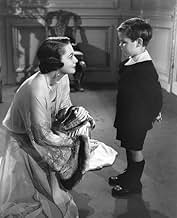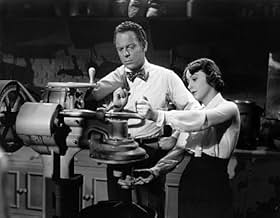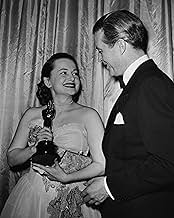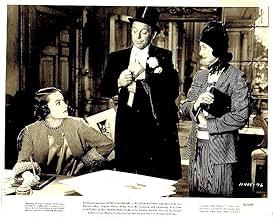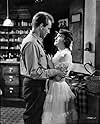NOTE IMDb
7,6/10
3,1 k
MA NOTE
Ajouter une intrigue dans votre langueAn unwed mother, forced to give up her child to avoid scandal, follows her son's life from afar even as she prospers in business.An unwed mother, forced to give up her child to avoid scandal, follows her son's life from afar even as she prospers in business.An unwed mother, forced to give up her child to avoid scandal, follows her son's life from afar even as she prospers in business.
- Réalisation
- Scénario
- Casting principal
- Récompensé par 1 Oscar
- 3 victoires et 2 nominations au total
Olivia de Havilland
- Jody Norris
- (as Olivia De Havilland)
Billy Ward
- Gregory - Younger
- (as Bill Ward)
Avis à la une
Although I don't think To Each His Own is as good as Olivia DeHavilland's other Oscar winner The Heiress or as good as the film she lost for in between these two, The Snake Pit, To Each His Own was the film that Olivia finally came into her own as an actress. She also showed Jack Warner a thing or two about type casting.
The story of To Each His Own is very much like something that Olivia's friend from Warner Brothers, Bette Davis, might have done. Bette won and was nominated multiple times for films like these and it's the stuff that Olivia badly wanted to do and was thwarted by Jack Warner who could only see her as the clinging leading lady to some dashing hero like Errol Flynn.
This film is all Olivia and she's the right age to do it. She was 30 at the time she made To Each His Own and the part called for her to age from her Twneties to her Forties. When we first meet her she's a a rather unhappy middle aged spinster doing duty as an air raid warden in wartime London. She's an American expatriate who is a cosmetics queen though her factory has now been converted to war use. She meets up with dashing Roland Culver who's a titled earl doing the same work and her thoughts go back to her years as a kid during that first World War.
A romance with a dashing flier played by John Lund and she's left pregnant and no chance of married when he's killed in action. Illegitimate birth was a horrible situation back in the day, so Olivia gives up the child to friends Philip Terry and Mary Anderson. Still the maternal instincts can't be snuffed out and she intrudes in their lives as well as a friend of the family her own child refers to as an 'aunt'.
Of course the whole thing becomes impossible and Olivia eventually moves to London when her factory becomes British based. Still she never stops thinking about the child someone else is raising.
Playing Josephine Norris as a young girl was no stretch because that's what she was playing all those years at Warner Brothers. But the more difficult challenge and what got her the Oscar for Best Actress was the way Mitchell Leisen guided her through the many stages of life. That called for Olivia to draw from the wellsprings of talent and ability that she knew she had and couldn't convince Jack Warner of the same.
The film was aided at the box office by the popularity of the song To Each His Own. You will not hear a note of it in the film, but The Ink Spots and Tony Martin had best selling records that year, The Ink Spots version going to number one on that Hit Parade that Lucky Strike sponsored. In fact I'm sure the popularity of the song and the film aided each other.
To Each His Own also earned an Academy Award nomination for Charles Brackett for Best Original Story.
You watch this film and you wonder just what Jack Warner must have been thinking when Olivia DeHavilland's name was announced on Oscar night.
The story of To Each His Own is very much like something that Olivia's friend from Warner Brothers, Bette Davis, might have done. Bette won and was nominated multiple times for films like these and it's the stuff that Olivia badly wanted to do and was thwarted by Jack Warner who could only see her as the clinging leading lady to some dashing hero like Errol Flynn.
This film is all Olivia and she's the right age to do it. She was 30 at the time she made To Each His Own and the part called for her to age from her Twneties to her Forties. When we first meet her she's a a rather unhappy middle aged spinster doing duty as an air raid warden in wartime London. She's an American expatriate who is a cosmetics queen though her factory has now been converted to war use. She meets up with dashing Roland Culver who's a titled earl doing the same work and her thoughts go back to her years as a kid during that first World War.
A romance with a dashing flier played by John Lund and she's left pregnant and no chance of married when he's killed in action. Illegitimate birth was a horrible situation back in the day, so Olivia gives up the child to friends Philip Terry and Mary Anderson. Still the maternal instincts can't be snuffed out and she intrudes in their lives as well as a friend of the family her own child refers to as an 'aunt'.
Of course the whole thing becomes impossible and Olivia eventually moves to London when her factory becomes British based. Still she never stops thinking about the child someone else is raising.
Playing Josephine Norris as a young girl was no stretch because that's what she was playing all those years at Warner Brothers. But the more difficult challenge and what got her the Oscar for Best Actress was the way Mitchell Leisen guided her through the many stages of life. That called for Olivia to draw from the wellsprings of talent and ability that she knew she had and couldn't convince Jack Warner of the same.
The film was aided at the box office by the popularity of the song To Each His Own. You will not hear a note of it in the film, but The Ink Spots and Tony Martin had best selling records that year, The Ink Spots version going to number one on that Hit Parade that Lucky Strike sponsored. In fact I'm sure the popularity of the song and the film aided each other.
To Each His Own also earned an Academy Award nomination for Charles Brackett for Best Original Story.
You watch this film and you wonder just what Jack Warner must have been thinking when Olivia DeHavilland's name was announced on Oscar night.
First, let me say I'm in awe of the previous reviewers and their spot-on knowledge of this film and Olivia de Havilland's body of work. Bravo, and thank you for pointing me towards this "hidden" treasure.
So allow me to confirm that this "small" 1946 movie is still riveting fare in 2010. The subject matter is just as relevant today and will speak to women for generations to come. In that regard, its forever timeless.
Filmed in b&w, and happily so, though 7 years newer than "The Wizard of Oz"... I'm still waiting for them to colorize the rest of that bloated Saturday matinée flick. *s* Tune in next time when I attack "Gone with the Wind," "Casablanca" and "Citizen Kane."
This film dealt with a delicate subject in a frank and realistic manner. I'm particularly impressed by the way this movie was story-boarded. It flowed brilliantly. If shot today, it would be shoved in my face, every stinkin' detail, nothing left to the imagination... plenty of yelling, smashing dishes and cussing.
Equally impressive is Ms. de Havilland's Oscar-winning performance. I couldn't take my eyes off her. When the movie took her back 20 years younger, my mouth dropped.
But it was much more than the make-up. It was Olivia.
Happy ending or sad? not telling. I'll reveal this, though. This 55 year old man doesn't typically cry at weddings or funerals, but by the closing credits, both cheeks were wet. But then maybe its because she reminds me of my mother, 1933-1981.
Search out this gem.
So allow me to confirm that this "small" 1946 movie is still riveting fare in 2010. The subject matter is just as relevant today and will speak to women for generations to come. In that regard, its forever timeless.
Filmed in b&w, and happily so, though 7 years newer than "The Wizard of Oz"... I'm still waiting for them to colorize the rest of that bloated Saturday matinée flick. *s* Tune in next time when I attack "Gone with the Wind," "Casablanca" and "Citizen Kane."
This film dealt with a delicate subject in a frank and realistic manner. I'm particularly impressed by the way this movie was story-boarded. It flowed brilliantly. If shot today, it would be shoved in my face, every stinkin' detail, nothing left to the imagination... plenty of yelling, smashing dishes and cussing.
Equally impressive is Ms. de Havilland's Oscar-winning performance. I couldn't take my eyes off her. When the movie took her back 20 years younger, my mouth dropped.
But it was much more than the make-up. It was Olivia.
Happy ending or sad? not telling. I'll reveal this, though. This 55 year old man doesn't typically cry at weddings or funerals, but by the closing credits, both cheeks were wet. But then maybe its because she reminds me of my mother, 1933-1981.
Search out this gem.
I found this web site so I could find this movie! This story was so captivating and Olivia's performance was so endearing that I was glued to the television at 2am and didn't care! For those of you who love the tales of tragic love denied and then bestowed - this is one of the best kept secrets of classic movies.
I caught this one on a late-night TV broadcast some years ago and was immediately hooked by Olivia's beautiful performance (plus being a sucker for tear-jerking stories with a flashback structure, I'm embarrassed to admit.) With Paramount's finest artisans and technicians in all departments to enhance her return to the screen, Olivia's Oscar was well-earned, indeed.
Other IMDb comments on this title are "on the money" (except for the one nay-sayer...Can't please everyone!) but no one mentioned John Lund's (as Gregory, Josephine Norris' long-lost son, rediscovered during his wartime London leave) constantly having to exclaim "Holy Canarsie!" before nearly every line of his dialog. After the first couple of times I wanted to scream at him, "Oh, stuff it!" But then, we're all guilty of overusing certain expressions, but THAT one was REALLY annoying. No wonder the script failed to win the Academy Award. So there!
Other IMDb comments on this title are "on the money" (except for the one nay-sayer...Can't please everyone!) but no one mentioned John Lund's (as Gregory, Josephine Norris' long-lost son, rediscovered during his wartime London leave) constantly having to exclaim "Holy Canarsie!" before nearly every line of his dialog. After the first couple of times I wanted to scream at him, "Oh, stuff it!" But then, we're all guilty of overusing certain expressions, but THAT one was REALLY annoying. No wonder the script failed to win the Academy Award. So there!
After winning her two-year court battle with Warner Bros., OLIVIA DE HAVILLAND became a free-lancer and got her big chance when Paramount offered her TO EACH HIS OWN, a script that had already been turned down by Ingrid Bergman and Ginger Rogers. Everyone shines in this movie, from the leads (OLIVIA DE HAVILLAND and JOHN LUND) to the smallest bit players.
De Havilland was perfect as Jody Norris, realistically portraying a young girl of seventeen and then various stages of maturity, ending as a brusque, middle-aged business woman in war-torn London of 1944. Her range as an actress is fully demonstrated and she does a remarkable job of playing the heroine at various stages of development.
John Lund is excellent too in a dual role (her lover and later her grown son), Bill Goodwin as a good-hearted pal, Philip Terry as another suitor who still loves her after marrying her friend (Mary Anderson). Anderson never had a better role than she does as the jealous, neurotic wife unwilling to let Jody have her own child back.
An intelligent script, detailed period direction by Mitch Leisen, fine background score by Victor Young and memorable moments from every player in the large cast. This is one Madame X kind of story that still holds up today. Probably the best soap-opera of the '40s, played to the hilt by a wonderful cast.
I would be remiss if I didn't mention Roland Culver as Lord Desham. Brilliant performance. And on top of all the drama, there's a lot of humor and touches of real Americana, especially in the early scenes depicting Jody's small-town life.
Summing up: This was a huge box-office hit in the summer of '46 and re-ignited Olivia's career after a three year absence from the screen.
De Havilland was perfect as Jody Norris, realistically portraying a young girl of seventeen and then various stages of maturity, ending as a brusque, middle-aged business woman in war-torn London of 1944. Her range as an actress is fully demonstrated and she does a remarkable job of playing the heroine at various stages of development.
John Lund is excellent too in a dual role (her lover and later her grown son), Bill Goodwin as a good-hearted pal, Philip Terry as another suitor who still loves her after marrying her friend (Mary Anderson). Anderson never had a better role than she does as the jealous, neurotic wife unwilling to let Jody have her own child back.
An intelligent script, detailed period direction by Mitch Leisen, fine background score by Victor Young and memorable moments from every player in the large cast. This is one Madame X kind of story that still holds up today. Probably the best soap-opera of the '40s, played to the hilt by a wonderful cast.
I would be remiss if I didn't mention Roland Culver as Lord Desham. Brilliant performance. And on top of all the drama, there's a lot of humor and touches of real Americana, especially in the early scenes depicting Jody's small-town life.
Summing up: This was a huge box-office hit in the summer of '46 and re-ignited Olivia's career after a three year absence from the screen.
Le saviez-vous
- AnecdotesThis was Olivia de Havilland's first film role in three years. She was suspended by Warner Brothers after she filed suit against the studio on August 23, 1943, and was officially fired upon winning her suit by unanimous decision on December 8, 1944. Because of this lawsuit and her reputation as a perfectionist, de Havilland was labeled "difficult" in show business, temporarily making her an undesirable choice for many producers.
- GaffesWhen Captain Cosgrove shuts off the power to his biplane, it continues to glide on a level path. Biplanes have very high drag because they have two wings and all the supports in between. The plane would have started to fall toward the ground, not continue on. The clouds in the background show a level path of travel.
- Citations
[last lines]
Captain Bart Cosgrove: I think this is our dance, Mother.
- ConnexionsFeatured in The 40th Annual Academy Awards (1968)
- Bandes originalesThree Little Fishies (Itty Bitty Poo)
Word & Music by Saxie Dowell
Meilleurs choix
Connectez-vous pour évaluer et suivre la liste de favoris afin de recevoir des recommandations personnalisées
- How long is To Each His Own?Alimenté par Alexa
Détails
- Date de sortie
- Pays d’origine
- Langue
- Aussi connu sous le nom de
- To Each His Own
- Lieux de tournage
- Société de production
- Voir plus de crédits d'entreprise sur IMDbPro
- Durée2 heures 2 minutes
- Couleur
- Rapport de forme
- 1.37 : 1
Contribuer à cette page
Suggérer une modification ou ajouter du contenu manquant

